Spiders in the house can trigger discomfort, fear, and frustration for many. Whether it’s a small web in the corner or a large spider suddenly appearing on your wall, knowing how to get rid of spiders at home is vital to ensure your living space remains comfortable and safe. This article explores 10 powerful methods for removing spiders, preventing their return, and handling spider issues naturally, providing practical advice suitable for homes everywhere, including India.
Whether you want to know how to avoid spiders at home, how to kill spiders at home, or home remedies for spiders, this guide covers everything you need to know in detail. Let’s dive into these trusted methods step-by-step.
Table of Contents
10 Proven Strategies on How to Get Rid of Spiders at Home?
Spiders are unwelcome guests for many homeowners, often appearing in dark corners, basements, and hidden spaces. While most are harmless and even eat other pests, their webs and sudden presence can be unsettling. Fortunately, there are proven strategies, both natural and proactive, that you can use to safely reduce or eliminate spiders from your home. From regular cleaning to natural deterrents, a combination of these methods can help you maintain a spider-free environment
1. Maintain Cleanliness and Declutter Regularly
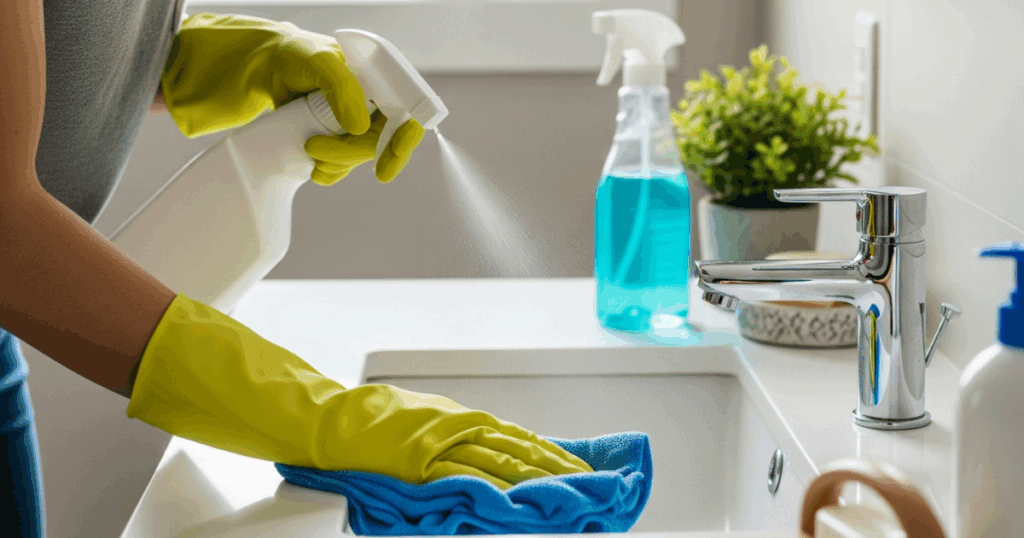
Regular housekeeping is your first line of defense against spider infestations. Spiders are naturally drawn to undisturbed, dusty areas where they can build webs and hunt for prey. A clean home eliminates both their preferred hiding spots and their food sources.
Key cleaning strategies include:
- Organize storage areas to eliminate dark, undisturbed spacesats and reduces their food sources by removing other insects.
- Vacuum all corners, ceilings, and floor edges weekly, paying special attention to cobwebs
- Dust surfaces regularly, especially in basements, attics, and storage areas
- Remove clutter such as cardboard boxes, old newspapers, and unused items
- Store seasonal clothing, shoes, and linens in sealed plastic containers
- Clean behind and under furniture where spiders commonly hide
- Wipe down windowsills and door frames where webs frequently appear
2. Seal Entry Points to Prevent Spiders in Your Home
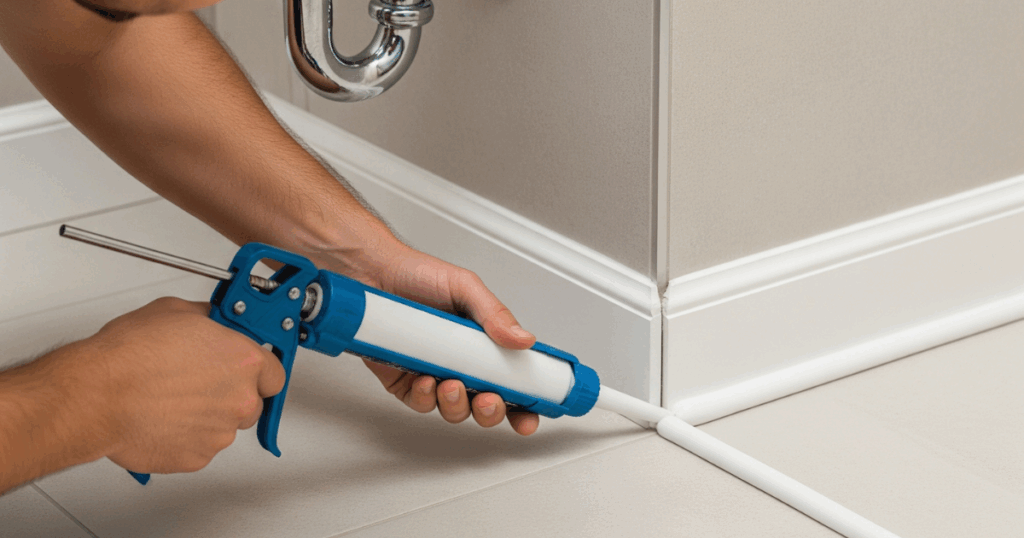
Creating a physical barrier is essential for long-term spider prevention. Even the smallest gaps can serve as entry points for these eight-legged intruders, making thorough sealing crucial for effective control.
Focus on these vulnerable areas:
- Check and seal gaps around air conditioning units and other wall penetrationss in house more effectively.
- Inspect and caulk cracks around windows, doors, and foundation walls
- Install or repair weather stripping around doors and windows
- Add door sweeps to exterior doors, especially basement and garage entrances
- Cover vents, chimneys, and exhaust fans with fine mesh screens
- Seal gaps around utility pipes, cables, and electrical outlets
- Repair torn or damaged window screens immediately
- Fill foundation cracks with appropriate sealants
3. Use Essential Oil Sprays as Natural Spider Repellents
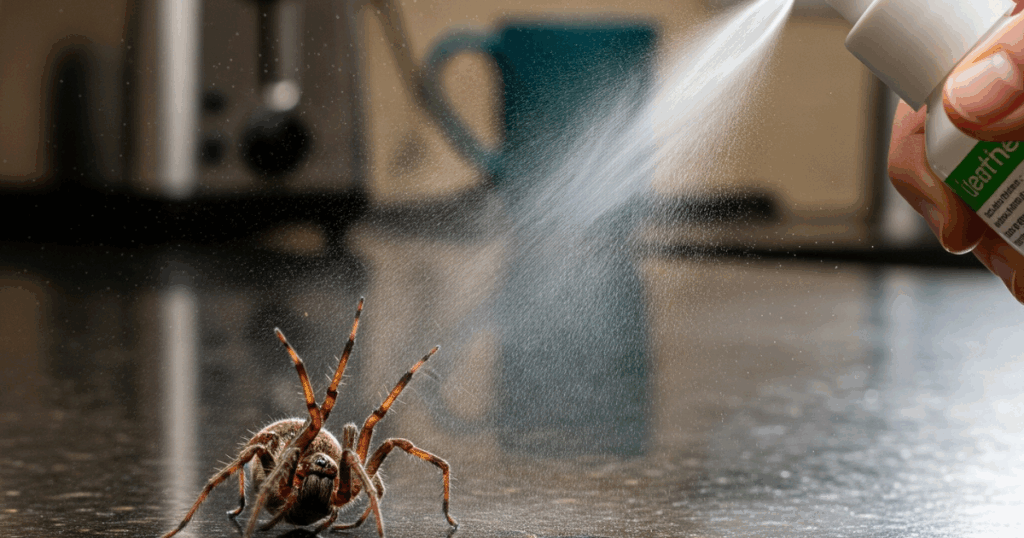
Essential oils provide a chemical-free solution that’s safe for families and pets. These natural compounds disrupt spiders’ sensory systems, making treated areas uninhabitable for them while leaving pleasant scents for humans.
Most effective essential oils and application methods:
- Soak cotton balls in oils and place in corners and storage areasd of spiders at home naturally without harmful chemicals.
- Peppermint oil: Mix 15-20 drops with water and a teaspoon of dish soap in a spray bottle
- Lavender oil: Creates a calming scent while repelling spiders effectively
- Eucalyptus oil: Particularly effective against larger spider species
- Tea tree oil: Offers antimicrobial benefits alongside spider repellent properties
- Citrus oils (lemon, orange): Natural deterrents with fresh, clean scents
- Apply sprays to baseboards, corners, windowsills, and doorways
- Reapply every 3-5 days or after cleaning for continued effectiveness
4. Spray Vinegar Mixture to Kill Spiders and Remove Webs
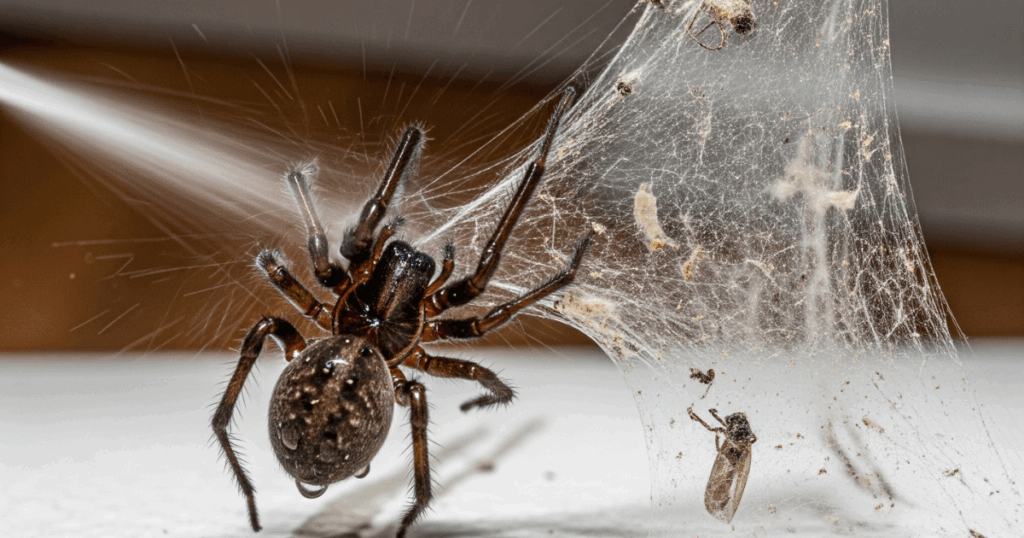
White vinegar’s acidity makes it an excellent natural spider killer and web dissolver. This common household item provides immediate results and helps prevent future infestations when used consistently.
Effective vinegar application techniques:
- Create a 50/50 mixture of white vinegar and water in a spray bottle
- Add a few drops of dish soap to help the solution stick to surfaces
- Spray directly on visible spiders for immediate elimination
- Apply to existing webs to dissolve the silk structure
- Treat corners, cracks, and crevices where spiders hide
- Focus on areas behind furniture and appliances
- Reapply weekly or whenever new spider activity is noticed
- Use undiluted vinegar for stubborn webs or heavy infestations
5. Control Outdoor Lighting and Yard Maintenance
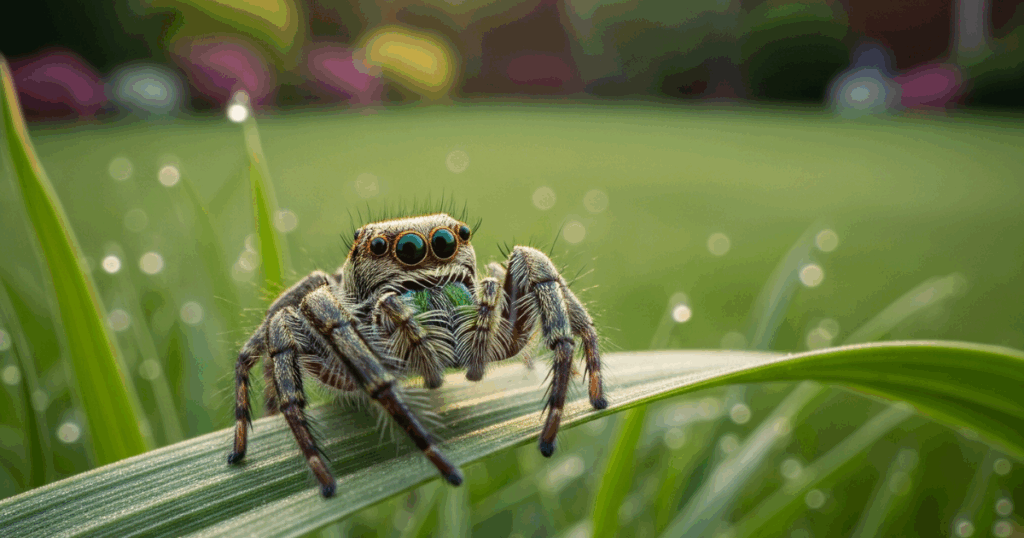
Managing your home’s exterior environment significantly reduces spider attraction. By eliminating their food sources and preferred outdoor habitats, you can prevent spiders from establishing populations near your home.
Outdoor spider prevention strategies:
- Replace bright white outdoor lights with yellow or sodium vapor bulbs that attract fewer insects
- Install motion sensors to minimize unnecessary lighting duration
- Keep outdoor lights turned off when not needed for security
- Trim vegetation and bushes away from home’s exterior walls
- Remove woodpiles, leaf debris, and other organic matter from around the foundation
- Maintain proper drainage to prevent moisture accumulation
- Store firewood at least 20 feet from the house and elevated off the ground
- Clear gutters regularly to prevent water pooling and insect breeding
6. Apply Diatomaceous Earth in Susceptible Areas
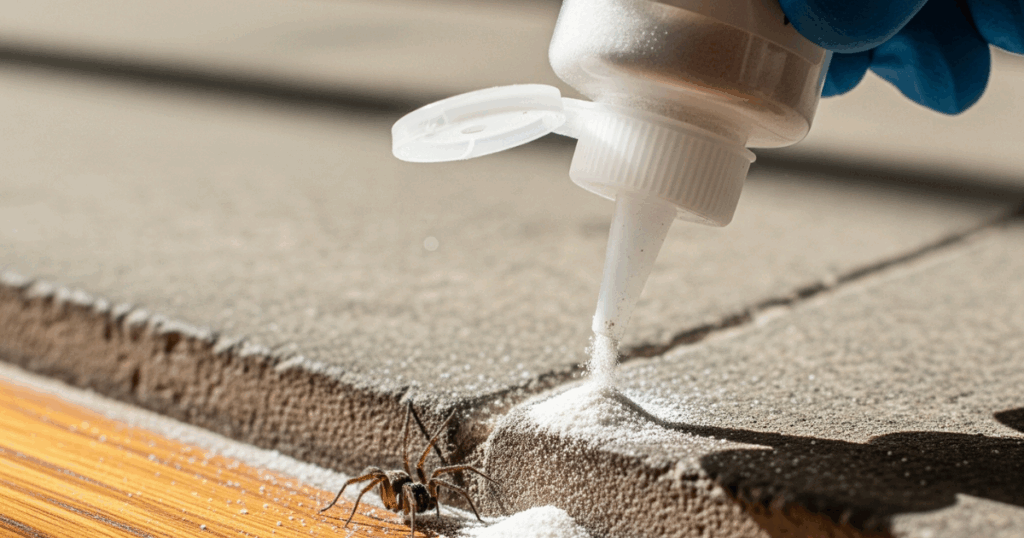
Food-grade diatomaceous earth offers a long-lasting, non-toxic solution for spider control. This fine powder works by damaging spiders’ exoskeletons when they crawl through it, leading to dehydration and eventual death.
Proper diatomaceous earth application:
- Use only food-grade DE to ensure safety around pets and children
- Apply thin, light dustings around doorways, baseboards, and window sills
- Focus on cracks, crevices, and areas where spiders commonly travel
- Keep the powder dry for maximum effectiveness
- Reapply after cleaning or if it becomes wet
- Avoid heavy applications that spiders might simply walk around
- Wear a dust mask during application to prevent inhalation
- Target specific problem areas rather than broadcasting throughout the home
7. Use Sticky Traps to Catch Spiders Inside the Home
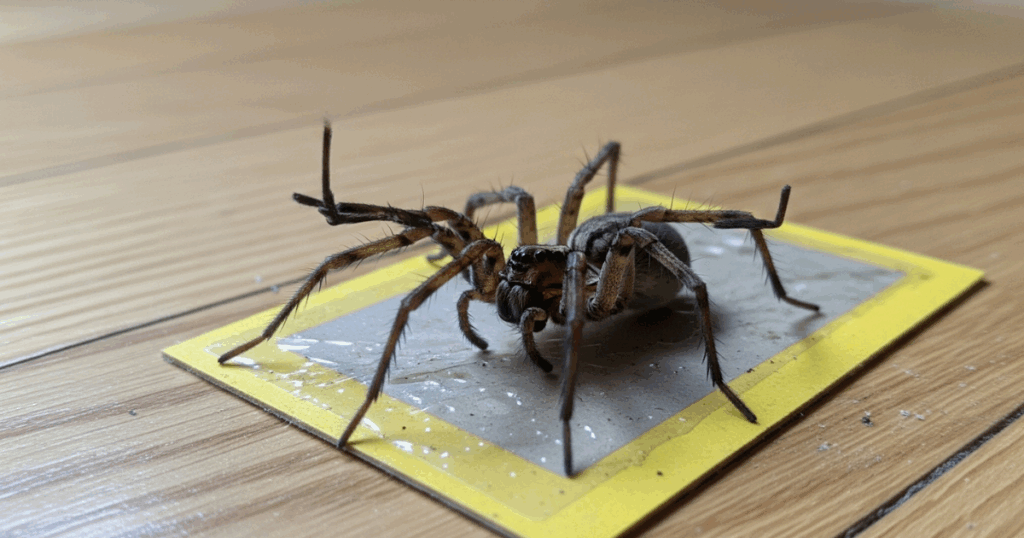
Sticky traps provide passive, continuous spider monitoring and control. These traps help you identify problem areas while capturing spiders without the need for direct contact or chemical treatments.
Strategic trap placement and maintenance:
- Position traps along baseboards in corners and behind furniture
- Place traps near known spider hiding spots like storage areas
- Use traps under beds, in closets, and near heating vents
- Replace traps weekly or when they become full of debris
- Monitor trap contents to identify spider species and population levels
- Fold traps carefully when disposing to prevent caught spiders from escaping
- Choose traps with attractant scents for enhanced effectiveness
- Document trap locations and results to improve future placement strategies
8. Manage Indoor Humidity and Moisture
Controlling moisture levels creates an inhospitable environment for both spiders and their prey. Dry conditions discourage spider habitation while also reducing the insect populations they feed on.
Humidity and moisture control methods:
- Install and run dehumidifiers in basements, bathrooms, and other damp areas
- Ensure proper ventilation in moisture-prone rooms
- Fix leaky pipes, faucets, and roof issues promptly
- Use exhaust fans during and after showers
- Avoid overwatering houseplants and use saucers to catch excess water
- Improve air circulation with ceiling fans or portable fans
- Address condensation issues around windows and pipes
- Store items off floors in potentially damp areas like basements
9. Specific Tips to Get Rid of Big Spiders at Home
Larger spiders require specialized approaches due to their size and potentially more defensive behavior. These methods focus on safe removal while preventing future encounters with sizeable arachnids.
Large spider management strategies:
- Remove hiding places by decluttering storage areas, especially at floor and ceiling levels
- Use long-handled tools like brooms or dusters for safe distance removal
- Employ the glass-and-paper method: trap spider under glass, slide paper underneath, then relocate outdoors
- Increase frequency of natural repellent applications in areas where large spiders appear
- Seal larger gaps and cracks that can accommodate bigger species
- Focus sticky trap placement in areas where large spiders commonly travel
- Remove outdoor debris piles where large spiders might establish nests
- Consider professional consultation for potentially dangerous species identification
10. India-Specific Natural Remedies for Spider Control
Tropical and subtropical climates like India’s require adapted approaches that account for higher humidity, monsoon seasons, and diverse spider species. Traditional Indian remedies combined with modern techniques provide culturally appropriate solutions.
Climate-adapted spider control methods:
- Use neem oil sprays regularly, as neem has traditional insect-repelling properties effective in humid climates
- Burn camphor tablets or powder in rooms periodically to create spider-repelling vapors
- Apply turmeric powder mixed with water around entry points for natural deterrent effects
- Increase cleaning frequency during monsoon seasons when spider activity peaks
- Keep outdoor vegetation trimmed away from home walls to prevent moisture retention
- Use mustard oil with garlic as a traditional spider repellent spray
- Employ coconut oil with curry leaves as a natural barrier treatment
- Adapt essential oil concentrations for higher humidity conditions to maintain effectiveness
Additional monsoon-specific strategies:
- Improve drainage around homes to prevent water accumulation
- Increase ventilation during humid periods
- Store items in moisture-proof containers during rainy seasons
- Apply desiccants like silica gel in storage areas prone to dampness
These comprehensive strategies, when implemented consistently and in combination, create multiple barriers against spider infestations while respecting both safety and environmental concerns. Regular monitoring and adjustment of these methods based on your specific home environment and local spider populations will ensure long-term success in maintaining a spider-free living space.
“Looking for safe solutions on how to get rid of caterpillars? Try these proven tips and reclaim your garden!”
Conclusion
By combining cleanliness, sealing entry points, using natural oils, vinegar sprays, diatomaceous earth, sticky traps, and proper yard care, you can effectively get rid of spiders at home and maintain a spider-free environment. These methods are safe, practical, adaptable to various home types, and tailored to the Indian environment for localized effectiveness. Empower yourself with this knowledge and reclaim your home from unwanted eight-legged visitors!
For comprehensive and hassle-free spider removal and long-term pest prevention, trust the professionals at Antipest Office. Visit us at the Antipest Office, Our trained technicians use safe and effective methods to protect your home and business. For service bookings and consultations, call us at +91 9819018398 .
How to Get Rid of Spiders at Home? – FAQs
How to get rid of spiders at home fast?
Clean and vacuum spiders and webs, seal all entry points, and spray essential oil or vinegar solutions around spider-prone areas for immediate relief.
What are the best home remedies for how to get rid of spiders at home?
Peppermint oil spray, vinegar mixture, citrus peels, diatomaceous earth, and neem oil are safe, natural repellents effective against spiders.
How to get rid of spiders at home ?
Seal cracks and gaps in windows, doors, and walls; install screens and door sweeps; and minimize outdoor insects by reducing lights and trimming plants.
How to get rid of spiders at home and cobwebs naturally?
Vacuum webs regularly, dust corners, and spray diluted vinegar or essential oils around spider-prone areas to discourage cobweb formation naturally.
How to get rid of spiders at home safely?
Use a tissue or glass-and-paper method, set sticky traps, or spray natural repellents. Avoid heavy pesticides for safer home use.
How to get rid of spiders at home(big spiders)?
Declutter hiding spots, apply essential oil sprays, use sticky traps, and safely catch and release or remove using a broom or jar.
How to get rid of spiders at home for long-term?
Combine regular cleaning, sealing entry points, maintaining dry conditions, and using natural repellents consistently to keep spiders away.
What is the best way to how to get rid of spiders at home in India?
Use neem oil sprays, burn camphor occasionally, maintain cleanliness especially during monsoon, and seal all possible entry points tightly.
How to get rid of spiders at home (small spiders)?
Clean crevices, use peppermint or eucalyptus sprays, seal tiny cracks, and place sticky traps near baseboards and corners.
Can spider veins be treated at home?
Elevate legs, wear compression socks, exercise, and use topical creams, but seek medical help for severe cases.

